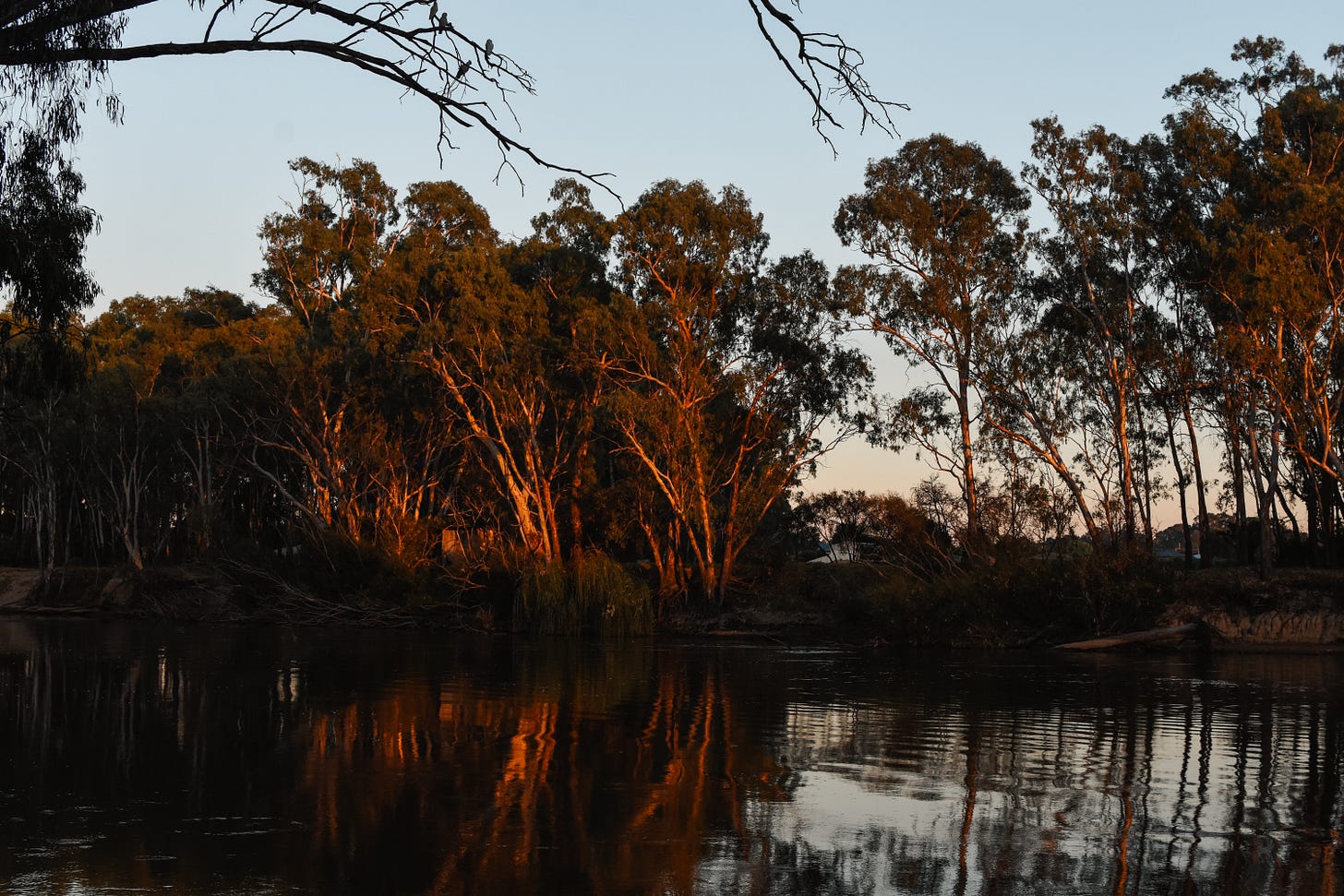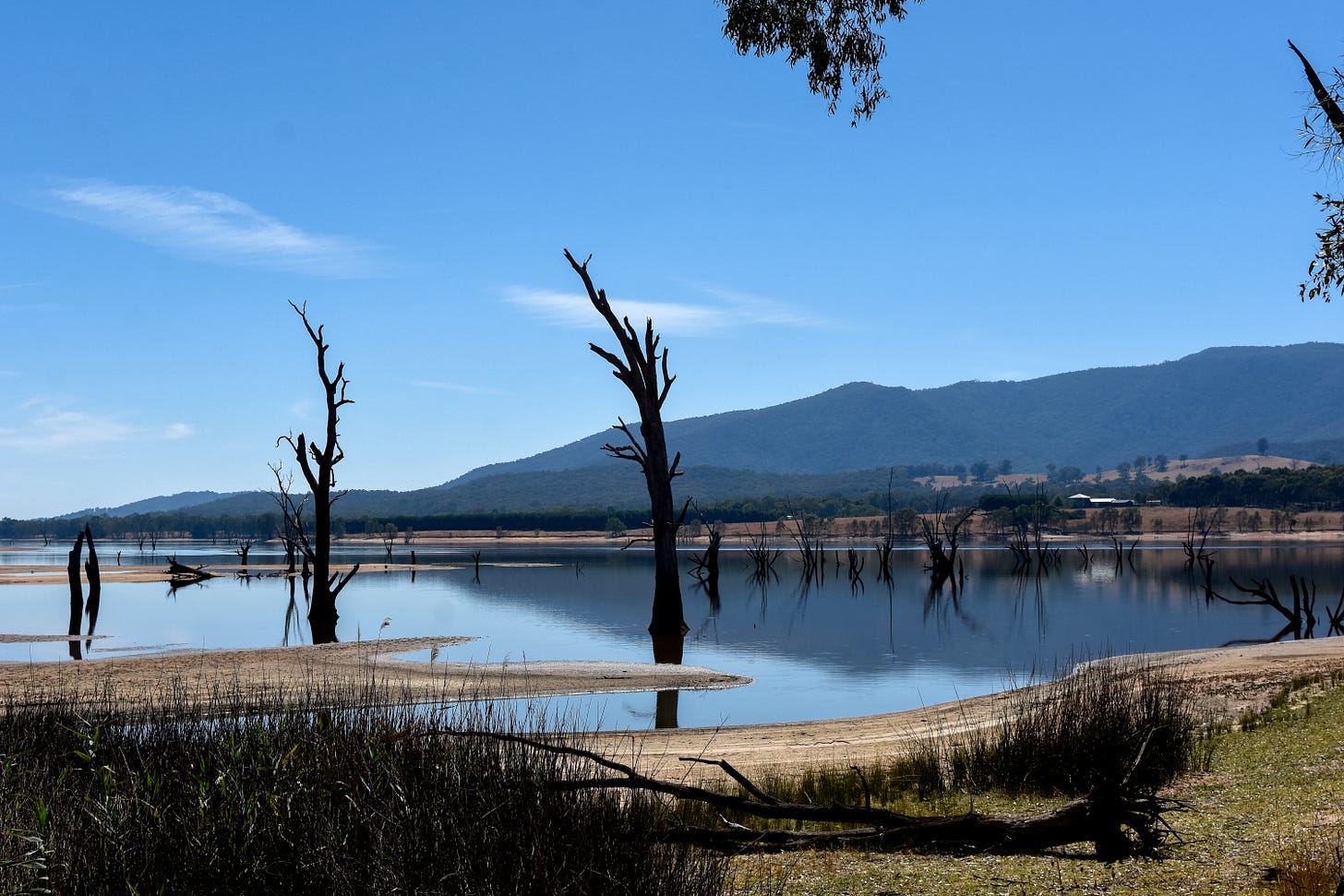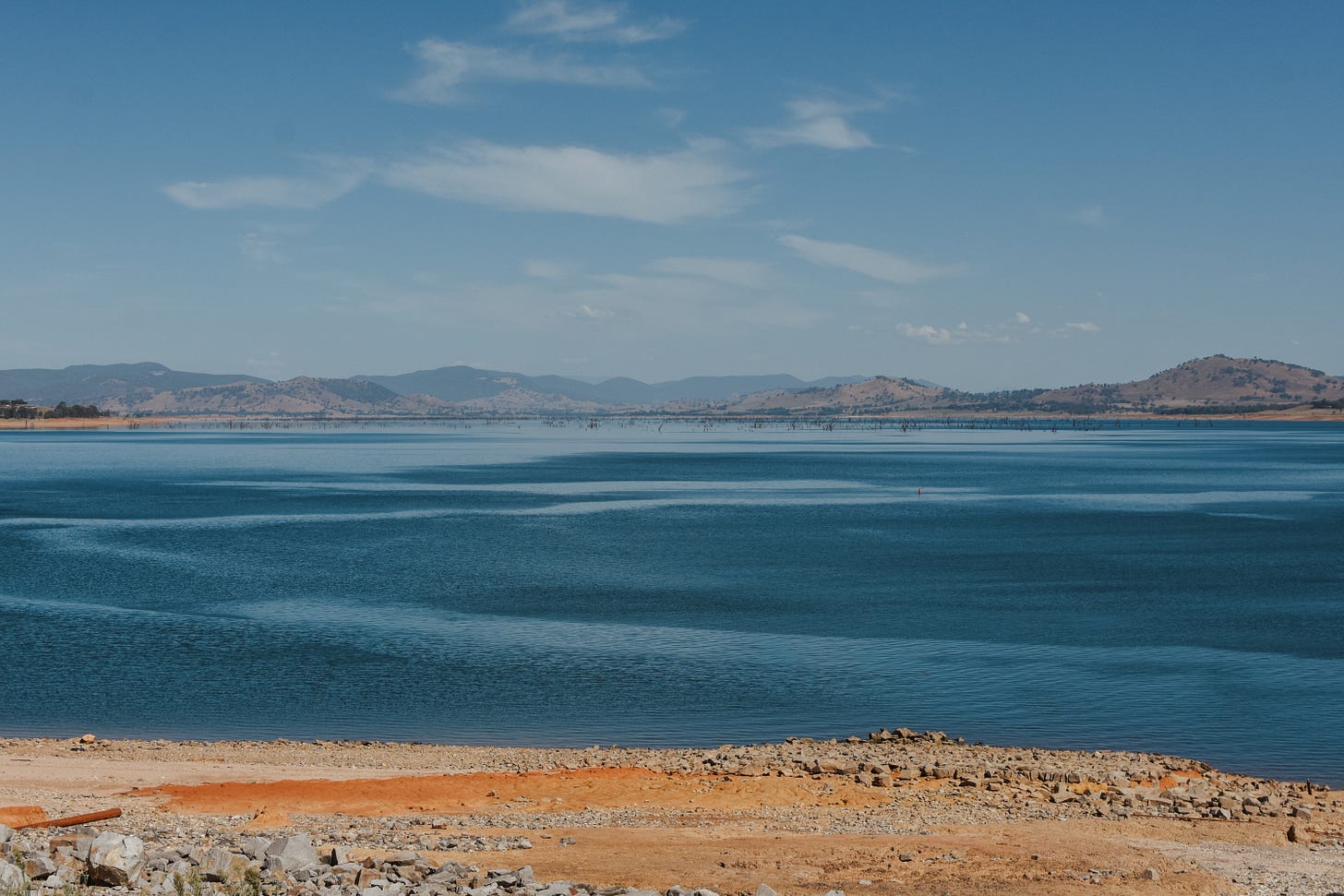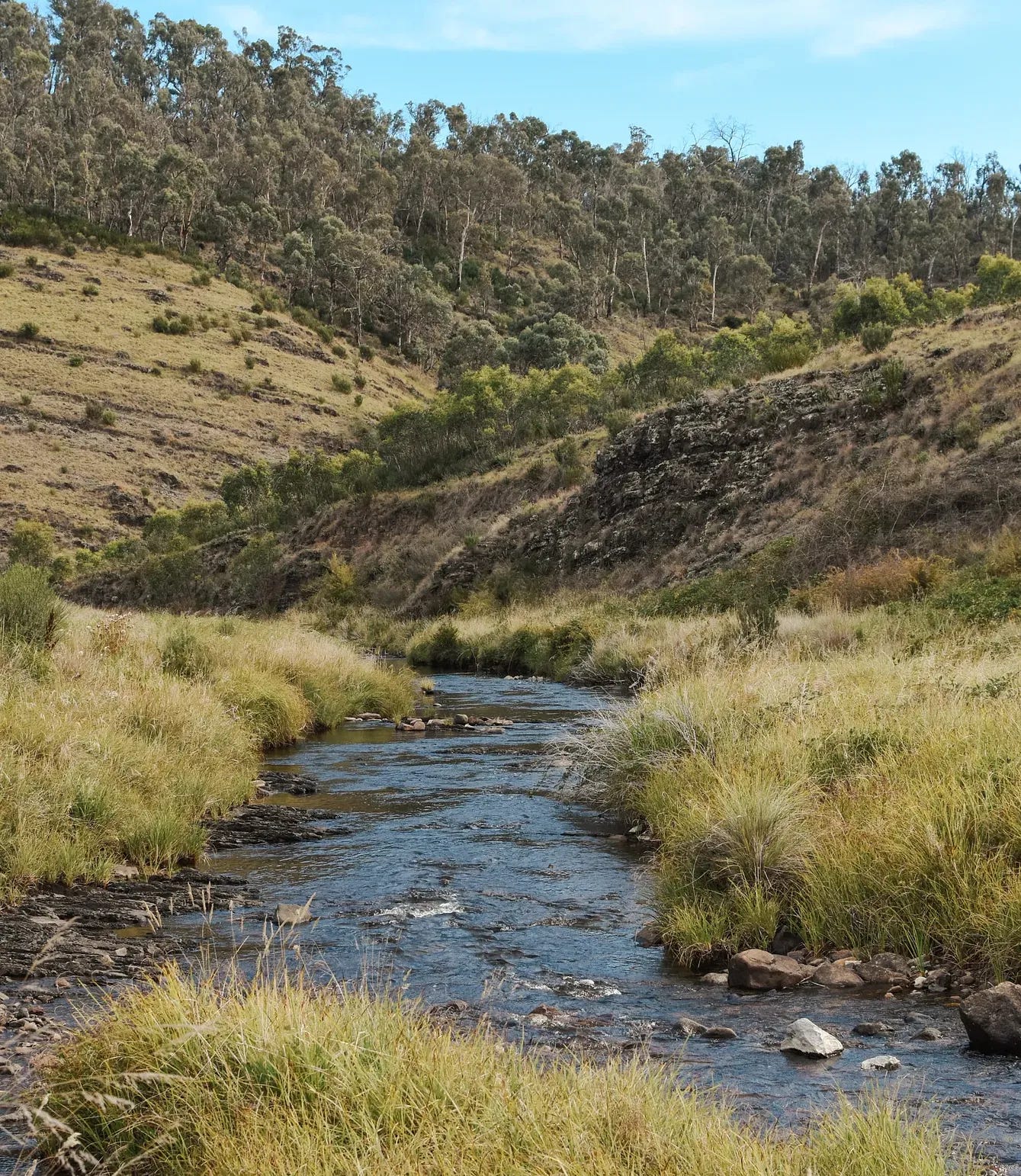The Narrow Road To Nowhere And Back Again
A roundabout journey that brought me back to writing on Substack.
‘Shall we gather at the river, Where bright angel feet have trod…’
Cloudstreet
I sit by this riverbed with an enamel cup of warm beer. The sun rebounds into my eyes off the rippling water. I put pen to paper for the first time in a long time while my partner wades ankle-deep, investigating rocks near the reeds. Now, I worry about snakes. However, my partner tells me I should be worrying about the bee I’m about to step on. I sip my beer and watch as the water rushes over stones smoothed by the centuries.
Getting up from my spot on the grass, I carefully wade into the water, looking at the rocks rolling from beneath my feet. I reach down, my hand cutting the stream like a ships bow, something having caught my eye beneath the icy water. Picking it up, I hold in my hand a piece of rusted metal. Looking around, I notice two small poles in the water that clearly show that a bridge must have once crossed here. I don’t know when it collapsed or rotted away. But there I stand, in the path of a phantom road that once led somewhere someone called home hundreds of kilometres from anywhere, letting the water flow around me and feeling, for the first time in a long time, at peace.
I’ve been slow to write on here these past months. Words and images run through my head, but they fail to form into anything coherent.
Gradually, I have been editing what some may consider a ‘novel’. Others might describe it as a long novella; a short novel; a recollection of things past–a string of memories that start far away and slowly rise until they fade back again; complete gibberish that only my parents would be kind enough to say: Well done. Now what?
It has been a strange process: two-and-a-half-years of procrastination, disappointment, failure, growth, hope, misery, understanding, and the eventual monotony of routine.
Recently, my routine has been occupied purely by editing this thing. I do what my parents consider to be actual work (the kind often described as ‘useful’ and ‘worth doing more of’) and then for the remainder of each week since the new year, I have been rebuilding, rewriting, and retelling – thanks in no small part to some clear-eyed and wonderful advice from an editor who has helped form books that have changed my life.
All of this is to say that I needed a break from that refinement. I needed to go out and see my country for a little while. Sometimes, you just need a little time to reacquaint yourself with home to be ready to start afresh.
So, wrenching ourselves into our somewhat-unpredictable car, my partner and I decided to leave the city and visit friends in rural Victoria, nearly a thousand kilometres away. Most days we would find campsites and set up our newly purchased ‘first home’. Still scarred from days of cadet hutchies (four to a piece of tarpaulin, the hard edges of stone scraping through our sleeping bags and spiders crawling through our unchanged five-day-old uniform), I was somewhat hesitant. My partner assured me it wouldn’t be like back then, and I, being too afraid to voice my deepest fears, eventually agreed.
All my time in the car was spent behind the wheel, as my partner can’t drive (I have no complaints, I have always loved driving). We planned to take the fastest route down to where our friends were working - a pub in a small town called Jamieson - then we would leisurely make our journey home.
On our first morning, we left Sydney, and set our sights on trying to cross the Victoria-NSW border before nightfall. The car ride down takes you through dipping highways and long stretches of painfully straight road. Once outside of Sydney and the hustle of early morning traffic, we found our journey moving faster than expected.
To keep ourselves busy, we listened to the entirety of Elliott Smith’s discography, ranking them in some vague order of brilliance (don’t @ me):
Figure 8
Either/Or
From a Basement On the Hill
Elliott Smith
Roman Candle
XO
As we drove through the Southern Highlands, my partner and I watched a group of people parachuting through the sky, peacefully drifting in circles. Then, out of the corner of the car window, we saw one of the parachuters plummet down, moving at a concerning speed for being so close to the ground. No one should fall to earth like that. In the silence, Elliott Smith hums: ‘There's nothing wrong that wasn't wrong before / Had a second alone with a chance let pass / And everybody's gone at last.’ All we can do is hope as we witness the shape of a person and their chute fall behind the cover of trees and into a story we will remember once happening.
We made a lunch pitstop in Yass, wandering around in the tarmac burn rising in waves, finding a place in the shade by the Yass River to make sandwiches. We continued on, passing the Dog on the Tucker Box, where I spent some time standing and watching burnt grass swallow the remains of a long-deserted hull of a halfway-house. We flew past a solo man at 110kmph as he leaned down to pick up rubbish along the centre of the highway. Neither of us could tell how he got there, but we appreciated his desire to clean.
After over 600 kilometres of driving, we crossed the border and found a free camp spot by the Murray River. We stood in Victoria, while somebody walked their dog along the opposite embankment back in NSW. The heat was putrid. But we put up our tent joyfully and admired our choice of camping spot. Walking along the river, I politely told my partner to stop moving (maybe slightly forcefully) as I watched a red-bellied black snake slither from the water’s edge and past our feet. Slowly, we walked backward. The snake calmly continued through the low grass and slid into a rotten log.
‘That’s the first proper snake I’ve seen in the wild here,’ my partner said.
‘Let’s hope it’s the last,’ I said.
We left our tent, crossed a bridge that separated the two states, and had a pint and burger in a pub. I talked to the barman about the complexities of owning pokies in a small town.
‘If we had two pokies, we would be able to pay for all of our overheads,’ the bar man said. ‘But we can’t because you get a certain number per area, and that RSL has all of them.’
‘I didn’t know that,’ I said. ‘How many do they have?’
‘Oh, about 400.’
‘400? That’s insane.’
‘It’s no banana, let me tell you.’
As we walked back to our camp, the sun singed the sky crimson at its edges in the boiling dark of dusk. The temperature hadn’t bothered to drop, and the night was spent conscious of snakes in our vicinity and trying not to sweat to death.
The next morning, we were woken around 4am by a stadium of screaming galahs. To describe this level of sound is nearly impossible. After some time, it became all we knew, and we began to accept the white noise of a thousand birds. But then, seemingly at random, the sound got louder, and we thought we might have to check ourselves into an asylum.
I had barely slept, my pillow drenched in sweat. There was no way to tell the birds to quieten down, and the sound was so all-encompassing that we packed up our tent and planned to leave by morning light. However, as the sun rose, the water that flowed past eucalypts and stringy barks peeling like rashers of bacon was painted in such vibrant shades of ochre and fire that we stood for a time and watched the birds as they fed on bugs in the otherwise cool calmness of morning.
We began our final push towards Jamieson. I forced us to stop at Glenrowan to revisit my childhood obsession with Ned Kelly. The town—its shops all still closed when we arrived—had been transformed since I was a child. Old rickety wooden dioramas of Kelly shot dead on a log had been replaced by shiny new centres of learning, an animatronic play of the Kelly gang, a well-signed path of the events that led to Kelly’s capture, and a reconstruction of his armour at the site of his fall. It all felt so different from my memory. Even in those few years since I was a child, things had changed so dramatically in this place that I thought would be unaffected by time.
Driving on, we followed roads that ran unbothered for forty minutes at a time. I didn’t turn the wheel once. Trees lay sideways like fossilised sea creatures beside reservoirs. In the dirt and rock landscape, water collected in divots, perfectly flat like mirrors of the sky. These water reserves appeared suddenly out of the baking countryside as our car bent round hills and mountains that were seemingly absent of life.
Finally, we reached Jamieson, some 900 kilometres from Sydney. The town was the site of an old gold mining settlement at the meeting of the Goulburn and Jamieson River. It was far away from anything, and it appeared to be just how everybody there liked it. Our friends—who lived and worked at the only pub in town—seemed to have been accepted as family. They were known by all the locals, and I found it amusing how these friends fit in so well in this remote part of Australia.
Our two days in Jamieson were spent walking its quaint and lush streets of crepe myrtle, drinking at the pub where they worked beneath one of the oldest magnolias in Australia, playing (and quickly losing) in the locals' pool competition against men and one woman, all wearing navy workwear and sand, sitting beside the river that was so beautiful that I felt the need to submerge myself in it—so I did—and just spending time with people whom I loved dearly. Our conversations swirled and flowed in circles, but they were always warm and kind and natural. One friend showed me how someone at the pub had been sending her pictures of brown snakes he’d caught and butchered before they could eat his chickens. The head was cut off, thrown in a bucket without remorse. I felt slightly ill looking at the photo. I think I’m too city-soft for that.
One early morning, I went for a solo walk around the town. Slowly, I returned to the caravan park we were staying at, but as I was about to enter through the gate, I saw movement across a patch of grass. A fox stopped, turned its head to look at me, and then ran quickly into the brush. I recalled the chicken coop at the caravan park and wondered what I would do if I had to fight a fox away from a chicken. Then I heard a squawk. I thought nothing of it, but as the coop came into my line of sight, I saw an explosion of feathers. All the chickens stood still. Then I gaped as the fox—with a chicken in its mouth—jumped over the high fence and loped into the undergrowth. But I didn’t warn anyone. I didn’t fight the fox. I didn’t even attempt to chase it down. Would it have made a difference?
We decided that despite the lack of rain, we would take canoes down the river. Kindly, the owner of the canoe service drove us to a section of river he thought was deep enough for us to enjoy. On the drive, he asked how long I had been in Australia. I told him that I had always lived here and that I grew up in Sydney.
‘With that accent?!’ he said, surprised.
In our silly little canoes, we rolled over ankle-deep water, dragged our boats through ‘rapids,’ hopped between boulders in the murky water, capsized over actual rapids, filled our boats with water, and became drenched in sweat and muck. The river bent in hairpins, as cliffs rose from nowhere and curled in these arches of eucalypts and ferns. In the trees, kookaburras laughed at us, but I felt better knowing they were there. What was meant to take an hour took four, and we arrived back at the meeting of the two rivers before politely calling the canoe operator to pick us up.
The next morning, we said goodbye to our friends after dropping them off at a driving lesson (they had decided to learn to drive; otherwise, they might never be able to leave the town), and my partner and I slowly made our way back, deciding to take a longer route home through the Snowy Mountains, splitting our journey in two.
By one of the flat water reservoirs, we stopped the car to look at the half-sunken trees. I thought of old forests that had long been drowned, leaving only the skeletons of dead trunks rising like lightning from the flat surface. I smelled death. Only as we walked away did we notice the carcass of a sheep decaying just over the fence. Around our feet lay scattered bones that blended into the rubble.
My partner found a place for us to camp in a small town called Bethanga, right by Lake Hume. As the day reached its apex of 40 degrees, we found ourselves desperately in need of a swim, so we stopped by the dam and stepped out into the thick liquid of an Australian summer. The edges of Lake Hume looked like the surface of Mars. All the trees around the cracked rock had had the stone washed from beneath them, exposing tree roots that looked like the legs of a spider. I thought to myself how Ent-like they looked and that maybe Tolkien was onto something. The water lay so still that it seemed possible to swim to the other side. I only found out later that perspective is a strange thing—that it was many kilometres across and that fast-moving currents streamed beneath the surface.
My partner and I sat in the shallow water. I dug my hands into the sludge-like sand, watching it sparkle, thinking that I had found gold. My partner told me I was a fool, that it was just pyrite. I hoped that I might slowly uncover something precious.
When we arrived at our campsite beside a beautifully kept cricket field, we were moved by how idyllic the small town was. The township had built a space for people to camp freely, with amenities and plenty of space for privacy, while creating easy paths to the small local pub and café, where everybody was friendly and pleased to have people visiting. We had a pint, spoke to one of the locals—who was very interested in our journey—played some cards, then made our way back to our tent.
The next morning, after the best sleep I had had in a tent, we packed up and headed towards the Snowies. The journey was slow along the highway, and I was thankful to not see another road train pass me at 150 km/h. Turning, we began our ascent towards where we would spend our final night.
I had chosen the spot we would camp at because of nostalgia. When I was young, my dad, brother, and I would take these road trips over the summer holidays. My dad would spend a week driving us to remote corners of the country, from White Cliffs, to Cameron Corner, and back to the Snowy Mountains. I wasn’t sure why, but I thought it was to illustrate to my brother and me that this was, in fact, where we came from.
That this, this land of high barren mountains, sweeping plains, dead forests, winding rivers, steep gorges, flat deserts, and wild fields, was a part of who we were. Despite all its contradictions, its complexities, its terrible history, its sheer remoteness, this country was, in fact, part of us, and we should try to understand and see it. I had taken those trips for granted. I thought of them as time spent away from television, friends, and video games. There was no purpose to them other than to fulfil some wild idea that my dad had.
Now I could see them differently. It had taken time.
On one of those trips, the three of us travelled through the Snowy Mountains, visiting the thermal pools near the Yarrangobilly Caves, walking through deserted landscapes where there were no landmarks, no sense of life, just flat plains of grass and flies. Oh, so many flies.
One morning, just as my father was about to deconstruct our tent, we were hit by the most vicious rainstorm I had ever witnessed. The rain fell in sheets. Being still quite young, my brother and I sat in the car, watching my dad run around the family-sized tent, trying to disassemble it as water careened against the windows, blurring our view.
Eventually, after throwing the remnants of the soaking tent into the back of our then-old Toyota Prado (which my dad still used), he ran around the car, threw himself in the front seat, and sat staring out the window. His eyes were filled with shock and rage that my brother and I didn’t say a word. After some time, he turned to us, smiled, and put on—of all things—Das Rheingold from Wagner’s Ring Cycle. Feeling somewhat overwhelmed, I decided to ask him what the Ring Cycle was about. My dad proceeded to explain in great detail the story of Wagner’s Ring. That killed at least three hours of my life, for better and for worse.
The place of our final night’s camp was near that spot. That morning of rain and Wagner—alongside my dad’s pleasure in explaining something so incomprehensible to his young children in the middle of a long road trip to nowhere—felt, in a sense, like a return to somewhere woven into my history.
The road rose, winding through mountains concealing great dams, and then, as the land opened onto these rolling plains, we were warned of brumbies roaming freely throughout this mythic setting. Over the crest of a hill, we found our campsite by a small riverbed. Families had set up campervans, having driven to this remote location for a weekend away, packed to the rafters with grandparents and children. Trees on the hills were ready for burning—leafless, but imbued with life trying to return as pops of green sprouted around their roots.
We left our tent and visited the thermal pools nearby. From my childhood, I remembered being able to drive right up to the pool. There were no amenities back then, and they still held a sense of remoteness, like a secret held by a select few. Now, you could only access them by walking down a steep road. They had been cleaned up, and were well-kept with showers and toilets, along with cooking stoves so that you could have your picnic beside them. We swam for a time, and quietly eavesdropped on the people describing how they sold everything they owned, bought campervans, and decided that they would travel Australia for a year—with their children in tow.
Refreshed, we followed the track around Yarrangobilly, past the caves and cracked paths that hid skinks blacker than burnt wood. I jumped back and screamed numerous times as my partner protected me from the lizards (seriously… lizards are far scarier than snakes ever could be).
We drove back to our camp spot, which had filled with more families and couples away for the weekend. Our tent remained pitched, nestled into a small flat bed of fluorescent green grass, right by the water’s edge. We poured ourselves a long neck we picked up on the way, and sat on opposite shores.
Now we are here.
Frogs click banjo-like. Crickets crackle like sparkling balls of light as they jump from the brush. Rocks roll along the riverbed.
And I sit.
Silently.
No thoughts.
No internet.
No desire to read.
No need to think.
Watching time pass.
Then I feel a surge, this desire to run and grab my notebook, untouched and clean, and write something. It can say nothing. It can be gibberish, some imaginary flow of thoughts. But I have to get it down, because I see the words fall together one by one, just as the rocks find new places to sit along the riverbed floor.
The words come when they want to. They fall like rain in places of serene detachment from a world too loud for its own good.
I watch my partner knit something extraordinary without a care for where the next round will take her. She spins beauty into being, stitching piece by piece until it is tangible (You can literally watch her stitch this piece together across the course of our trip - it’s much prettier than anything I could ever conceive of creating).
As I said, I’ve been slow to writing on here. Not because I can’t write - I have been doing a lot of other writing outside of A Readable Feast - but because I don’t know whether what I write here will lead anywhere.
This road trip will end up taking us 2000 kilometres. On our last day, I drive 650 kilometres back home, passing bands of brumbies grazing free, old timber sheds for people stuck in snowstorms, down through the Capital Territory, and all the way home. Those 2000 kilometres lead me through places I have never been, to people I care about deeply, to people I will remember but never meet again, and back to places once familiar and now changed.
It goes nowhere. I go so far.
Maybe, sitting by this river, I can see a reason to write. Maybe it’s that serenity, that understanding, that beauty that comes with coming back to something you hold close to your heart. Maybe it is seeing how it has changed. Maybe it is struggling to understand why you are back there. And maybe, it doesn’t need any reason at all.
‘There are words and words and none mean anything. And then one sentence means everything.’
Narrow Road to the Deep North










Beautiful writing, what a way to capture and eternalise an adventure
Beautiful. X